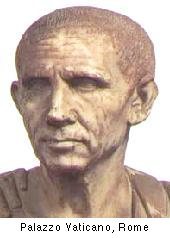Marcus Porcius Cato
Politician and writer; b. 234 BC (Tusculum, Latium), d. 149 BC
 Cato was the son of a yeoman. He participated in the second Punic War against Carthage. Lucius Valerius Flaccus, a member of the urban ruling class, noticed his talent for public speaking and legal argument (which Cato often used to promote strict morals and denounce luxury) and sponsored Cato into a political career.
Cato was the son of a yeoman. He participated in the second Punic War against Carthage. Lucius Valerius Flaccus, a member of the urban ruling class, noticed his talent for public speaking and legal argument (which Cato often used to promote strict morals and denounce luxury) and sponsored Cato into a political career.
From 199 BC Cato occupied various public positions and acquired significant wealth as the owner of a large farming estate. As praetor in Sardinia he successfully eradicated usury. One of his life-long aims was the restriction of financial independence of women; in 195 he unsuccessfully opposed the repeal of the Lex Oppia that restricted "female extravagance."
In 184 Cato and his sponsor Flaccus were elected censors. Roman censors were responsible for assessing property, estimating taxation and penalizing moral offenders by withdrawing voting rights and tribe membership. Other duties were the registration of citizens and property and the supervision of senatorial rolls.
Cato used his position to defend the "ancestral customs" (mos majorum), which he believed to be better moral standards than those of his days. He claimed that Greek culture in particular was detrimental to Roman morals and tried to keep all Greek influence out of Rome.
Cato served a period as ambassador to Carthage. What he saw convinced him that Carthage would again develop into a serious contender for power over the Mediterranean, and he began a crusade to see Carthage destroyed. Every of his speeches - he published 150 of them - ended with the words "delenda est Carthago" (Carthage ought to be destroyed). Rome declared war against Carthage a few months before Cato's death.
Cato's writing output was substantial, and he had a lasting impact on the development of Roman literature. He compiled an encyclopaedia and published works on medicine, the law and military science. Most of his works are lost, but his treatise on agriculture (De agri cultura), in which he draws on his own farming experience and describes old customs and superstitions, survives complete. It is the oldest remaining complete work in Roman prose.
home
 Cato was the son of a yeoman. He participated in the second Punic War against Carthage. Lucius Valerius Flaccus, a member of the urban ruling class, noticed his talent for public speaking and legal argument (which Cato often used to promote strict morals and denounce luxury) and sponsored Cato into a political career.
Cato was the son of a yeoman. He participated in the second Punic War against Carthage. Lucius Valerius Flaccus, a member of the urban ruling class, noticed his talent for public speaking and legal argument (which Cato often used to promote strict morals and denounce luxury) and sponsored Cato into a political career.